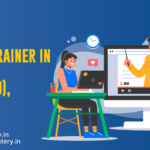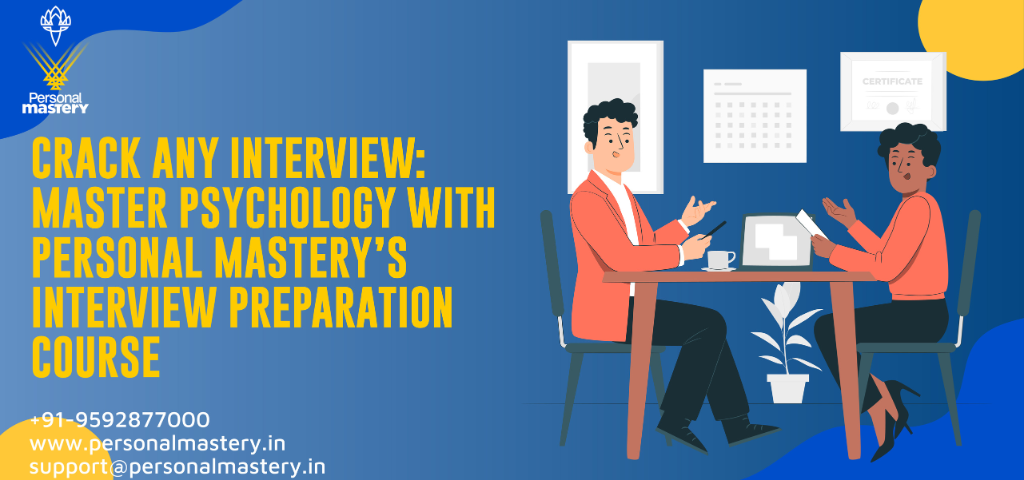
Best NLP Trainer in Bangalore (Bengaluru), Karnataka
May 2, 2025
Best NLP Trainer in Mumbai, Maharashtra
May 9, 2025Table of contents
- What Is Interview Psychology?
- What Is the Interviewer Really Thinking?
- Why First Impressions Matter More Than You Think
- The Role of Trick Questions in Interview Psychology
- Emotional Intelligence: A Core Psychological Asset
- Why a Course is Better Than Self-Study
- Building Confidence Through Practice and Feedback
- Post-Interview Psychology: The Follow-Up
- Final Thoughts: Elevate Your Interview Game
It’s 9:55 AM. You’re sitting outside the interview room, heart racing like you’ve just run a marathon. Your palms are sweaty, and your thoughts are bouncing between your resume points and the classic question, “Tell me about yourself.” A part of you wonders if you chose the right outfit, and another part is replaying every interview tip you’ve ever read.
If this scenario feels all too real, you’re not alone. The interview experience can be stressful, but understanding the psychology behind it can help you feel more confident and in control.
Here’s the truth: interviews are not just about your qualifications or experience. They are about how you carry yourself, how you communicate under pressure, and how well you connect with the person on the other side of the table. And that’s exactly why understanding interview psychology is the key to interview success.
This blog, along with the right Interview Preparation Course, will guide you through the psychological aspects of interviews, helping you understand what’s going on in the interviewer’s mind, how you can prepare effectively, and how you can become the most memorable candidate in the room.
What Is Interview Psychology?
Interview psychology is the study of how human behavior, emotions, and mental processes influence the outcome of a job interview. It involves understanding both your own responses and the psychological triggers of your interviewer.
Think of it like this: while you're answering questions, the interviewer is observing not just what you say, but how you say it. Your facial expressions, posture, tone of voice, and even your pauses all play a role in how you are perceived.
Most candidates focus only on preparing their answers. But top performers invest in understanding the dynamics of communication, non-verbal cues, and psychological signals. These are often the areas where interview coaching and structured interview training courses make a significant difference.
What Is the Interviewer Really Thinking?
While you're trying to give the perfect answer, the interviewer is silently assessing:
- Are you confident and trustworthy?
- Do you understand the company’s values?
- Will you fit into the team culture?
- How do you handle stress and uncertainty?
They are trying to get a 360-degree view of you in a very short time. That’s why a strong grip on interview psychology helps you position yourself with clarity and emotional intelligence.
A comprehensive interview preparation course helps you tune into these areas so you can deliver responses that are not only accurate but also aligned with the interviewer's expectations.
Why First Impressions Matter More Than You Think
You don’t get a second chance at a first impression. Studies show that most interviewers form their impression of a candidate within the first few seconds. This impression is largely based on non-verbal communication: your body language, smile, handshake, eye contact, and posture.
This is why high-quality interview preparation classes and coaching for interview success emphasize presence, tone, and confidence as much as technical responses.
If you want to be taken seriously, these initial seconds should reflect professionalism, confidence, and calm energy. Even small adjustments, like maintaining eye contact or sitting upright, can have a significant psychological impact.
For those in the Chandigarh region, it’s worth noting that the best interview preparation course trainer in Chandigarh, Panchkula & Mohali region offers internationally recognized programs designed specifically to master these skills.
The Role of Trick Questions in Interview Psychology
Questions like “What’s your biggest weakness?” or “Tell me about a time you failed” are not traps. They’re designed to evaluate your honesty, self-awareness, and resilience. The interviewer wants to see how you approach difficult situations and how emotionally mature you are.
It’s not about having the perfect answer; it’s about staying calm, showing ownership, and focusing on the learning or outcome.
Unfortunately, many candidates fall into the trap of giving textbook answers. This is where enrolling in an interview preparation course helps. You learn how to analyze questions, think critically, and communicate your thoughts with confidence.
Emotional Intelligence: A Core Psychological Asset
When it comes to interview psychology, emotional intelligence (EI) plays a pivotal role. Candidates who display empathy, awareness, and adaptability naturally build better rapport with interviewers.
Remember, interviews are human conversations at their core. It's not just about impressing someone; it's about connecting with them.
Professional interview coaching online sessions train you to stay composed, manage nervousness, and answer with both logic and warmth. These are traits that interviewers remember long after the interview ends.
Why a Course is Better Than Self-Study
Many candidates rely on YouTube videos, blogs, and friends’ advice to prepare. While that’s a good start, it often lacks structure and feedback.
Here’s why a certified interview preparation course adds more value:
- Real-time mock interviews
- Feedback from industry experts
- Correction of unconscious mistakes
- Exposure to diverse interview scenarios
- Structured learning of essential interview techniques
When you train under the best interview preparation course trainer in Chandigarh, Panchkula & Mohali region, you’re not just memorizing answers,you’re developing a new mindset.
Plus, with an internationally accredited certification by IBPCT, your credibility increases in the eyes of recruiters and HR professionals.
Building Confidence Through Practice and Feedback
One of the core elements of interview coaching is repetitive practice in a safe environment. You get to experiment with your answers, understand your strengths, and work on your blind spots.
Mock interviews, especially those conducted in professional interview preparation classes, allow you to experience pressure, receive feedback, and fine-tune your delivery. This practice creates muscle memory, so when you enter the actual interview, your body and brain know exactly what to do.
Confidence is not something you "turn on" magically; it’s built through consistent practice and reflection. A structured course ensures that this confidence becomes part of your personality.
Post-Interview Psychology: The Follow-Up
What you do after the interview matters just as much as what you do during it.
Following up with a thoughtful email shows professionalism, commitment, and interest in the role. It also leaves a lasting impression, which can be the deciding factor when multiple candidates are shortlisted.
Surprisingly, most people skip this step or send generic follow-ups. A good interview training course teaches you how to craft follow-ups that are warm, personal, and aligned with the tone of your interview.
Final Thoughts: Elevate Your Interview Game
Understanding interview psychology is not a luxury; it’s a necessity. Today’s competitive job market rewards those who go beyond surface-level preparation.
By training your mind, emotions, and communication style, you position yourself as a confident, capable, and emotionally intelligent candidate.
If you're serious about mastering interviews, invest in the right support. Join an interview preparation course, explore interview coaching online, and gain the tools you need to move forward.
And if you’re based in North India, take full advantage of the best interview preparation course trainer in Chandigarh, Panchkula & Mohali region, backed by an internationally accredited certification by IBPCT.
Your dream job is not just about applying; it’s about showing up prepared, professional, and powerful.


